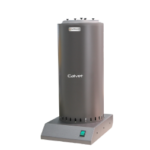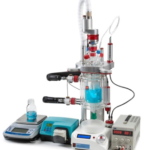MENUMENU

Evaluation of corrosion inhibitors for refinery and oilfield applications requires an apparatus that can simulate corrosive fluid and carbon/low alloy steel interaction, such as the rotating cage (RC) described in ASTM G170. Our high pressure, high temperature RC system includes a reactor system with a rotating cage, gas and liquid feed systems, reflux condenser, pressure controller, and control and data logging system. Components can be customised to meet specific testing requirements. What next? At SciMed, we are committed to providing our customers with the best possible experience. If you have any questions or would like to learn more about our…

Our vapor pressure determination system accurately measures the pressure of a vapor in equilibrium with its non-vapor phases in a closed container, dependent solely on temperature. By utilizing the static total pressure method, our system iteratively calculates the amount of components in the liquid and vapor phases to determine vapor-liquid equilibrium data, essential for chemical process development and design. The custom dual vessel system features a heated, temperature-controlled aluminum block to minimize temperature gradients and ensure accurate measurements. Valves and fittings are covered during normal operation. Invest in our system for precise measurements and efficient chemical process design. What next?…

Parr is thrilled to announce the latest addition to our reactor systems, which enables users to determine reaction enthalpy using power compensation calorimetry. This innovative technique offers a direct and intuitive way to quantify process power and calculate the enthalpy of the reaction. The power compensation calorimetry feature involves a reaction vessel with a circulating jacket that is isothermally controlled. The jacket is typically set to a temperature just below the desired reaction temperature, while the process temperature is regulated by adjusting the power to an electrical heater located inside the reaction vessel. This heater, also known as a compensation…

Calvet calorimetry can be used for process understanding answering question such as: How much heat is generated from the desired reaction? How much gas is generated from the desired reaction? How fast the desired reaction occurs? Is cooling adequate? The Calvet sensor is a 3D sensor composed by many thermocouples in series surrounding the sample cell and the reference cell. These instruments can be used with a large variety of cells to study batch or semi-batch experiments and can work in isothermal or in scanning mode in a temperature range of -196°C to 600°C. Due to the large variety of…

Reaction calorimetry is a non-intrusive, non- destructive, real time technique that yields valuable process data. The Atlas Calorimeter generates calorimetry data with the same effort required to run a regular chemistry experiment and accurately measures the power and enthalpy of chemical reactions under process like conditions. This provides information such as reaction kinetics and safety data that is invaluable in process optimisation, scale-up and hazard analysis. Main features of the Atlas HD Calorimeter Designed to be used by regular chemists and not just safety specialists. Can operate in power compensation or Heat flow calorimetry modes. Fully automated control with state-of-the-art…